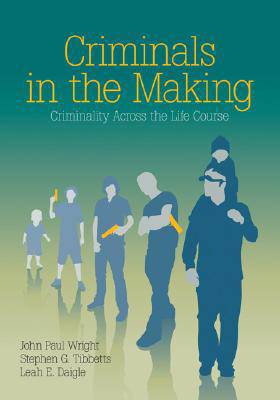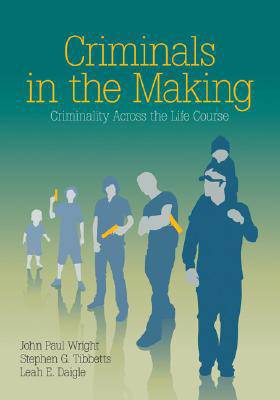
- Retrait gratuit dans votre magasin Club
- 7.000.000 titres dans notre catalogue
- Payer en toute sécurité
- Toujours un magasin près de chez vous
- Retrait gratuit dans votre magasin Club
- 7.000.0000 titres dans notre catalogue
- Payer en toute sécurité
- Toujours un magasin près de chez vous
Criminals in the Making
Criminality Across the Life Course
John Paul Wright, Stephen G Tibbetts, Leah E Daigle
Livre relié | Anglais
366,45 €
+ 732 points
Description
Congratulations to Steve Tibbetts, winner of the Outstanding Professional Development Award at CSU-San Bernadino!
"This book is interesting, informative, comprehensive, and--more importantly for students of criminology--accessible." --Robert Apel, University at Albany
"Without doubt, Criminals in the Making will spark debate, incite controversy and challenge mainstream criminological understanding."--THEORETICAL CRIMINOLOGY
Why do individuals exposed to the same environment turn out so differently, with some engaging in crime and others abiding by societal rules and norms? Why are males involved in violent crime more often than females? And why do the precursors of serious pathological behavior typically emerge in childhood?
The authors of this text address key questions surrounding criminal propensity by discussing studies of the life-course perspective--criminological research linking biological factors associated with criminality and social environmental agents thought to cause, facilitate, or otherwise influence one′s tendency towards criminal activity. The text offers a comprehensive, interdisciplinary understanding of the current thinking in the field about criminal behavior over the course of a lifetime and ends on a positive note, highlighting interventions proven effective and illustrating how the life-course perspective has contributed to a greater understanding of the causes of crime.
Key Features and Benefits
Designed for upper-level undergraduate and graduate students in criminal justice and criminology, sociology, and psychology programs, this groundbreaking supplement provides novel insights into criminal pathology for courses such as Criminological Theory and Introduction to Criminology.
"I think this is going to be an important book, one that generates discussion and maybe even motivates criminology to become more scientific. This book will force people to reassess their understanding of crime and see how many known facts of crime are illusory once biological concepts are considered."
--Matt DeLisi, Iowa State University
"This book is interesting, informative, comprehensive, and--more importantly for students of criminology--accessible." --Robert Apel, University at Albany
"Without doubt, Criminals in the Making will spark debate, incite controversy and challenge mainstream criminological understanding."--THEORETICAL CRIMINOLOGY
Why do individuals exposed to the same environment turn out so differently, with some engaging in crime and others abiding by societal rules and norms? Why are males involved in violent crime more often than females? And why do the precursors of serious pathological behavior typically emerge in childhood?
The authors of this text address key questions surrounding criminal propensity by discussing studies of the life-course perspective--criminological research linking biological factors associated with criminality and social environmental agents thought to cause, facilitate, or otherwise influence one′s tendency towards criminal activity. The text offers a comprehensive, interdisciplinary understanding of the current thinking in the field about criminal behavior over the course of a lifetime and ends on a positive note, highlighting interventions proven effective and illustrating how the life-course perspective has contributed to a greater understanding of the causes of crime.
Key Features and Benefits
- Includes a recurring boxed feature on the thief ′Stanley,′ adapted from Clifford Shaw′s classic case study that was published in a well-known book entitled "The Jack-Roller: A Delinquent Boy′s Own Story" to clarify the life-course concept
- Provides numerous helpful illustrations of the brain and nervous system to illustrate biological concepts,
- Addresses interesting issues such as the impact of lead on brain development and the limits of parental influences in boxed inserts throughout the book
- Features policy recommendations and initiatives for the prevention of crime in the concluding chapter to spark classroom discussion and guide future student research
Designed for upper-level undergraduate and graduate students in criminal justice and criminology, sociology, and psychology programs, this groundbreaking supplement provides novel insights into criminal pathology for courses such as Criminological Theory and Introduction to Criminology.
"I think this is going to be an important book, one that generates discussion and maybe even motivates criminology to become more scientific. This book will force people to reassess their understanding of crime and see how many known facts of crime are illusory once biological concepts are considered."
--Matt DeLisi, Iowa State University
Spécifications
Parties prenantes
- Auteur(s) :
- Editeur:
Contenu
- Nombre de pages :
- 328
- Langue:
- Anglais
Caractéristiques
- EAN:
- 9781412955195
- Date de parution :
- 16-05-08
- Format:
- Livre relié
- Format numérique:
- Genaaid
- Dimensions :
- 180 mm x 254 mm
- Poids :
- 725 g

Les avis
Nous publions uniquement les avis qui respectent les conditions requises. Consultez nos conditions pour les avis.






